2023届高考英语一轮讲义素材:D篇阅读精析Day16-17
文档属性
| 名称 | 2023届高考英语一轮讲义素材:D篇阅读精析Day16-17 | 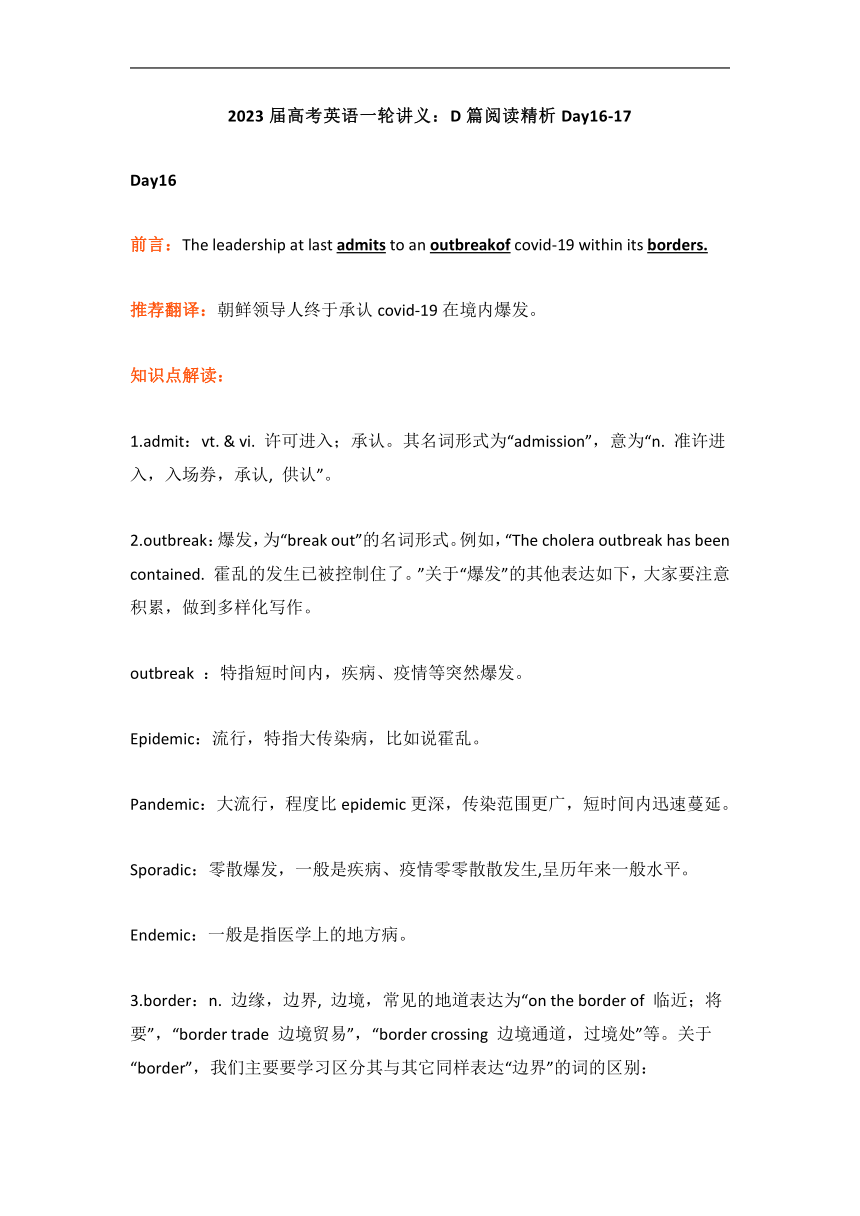 | |
| 格式 | docx | ||
| 文件大小 | 26.4KB | ||
| 资源类型 | 教案 | ||
| 版本资源 | 人教版(2019) | ||
| 科目 | 英语 | ||
| 更新时间 | 2022-10-17 07:29:24 | ||
图片预览

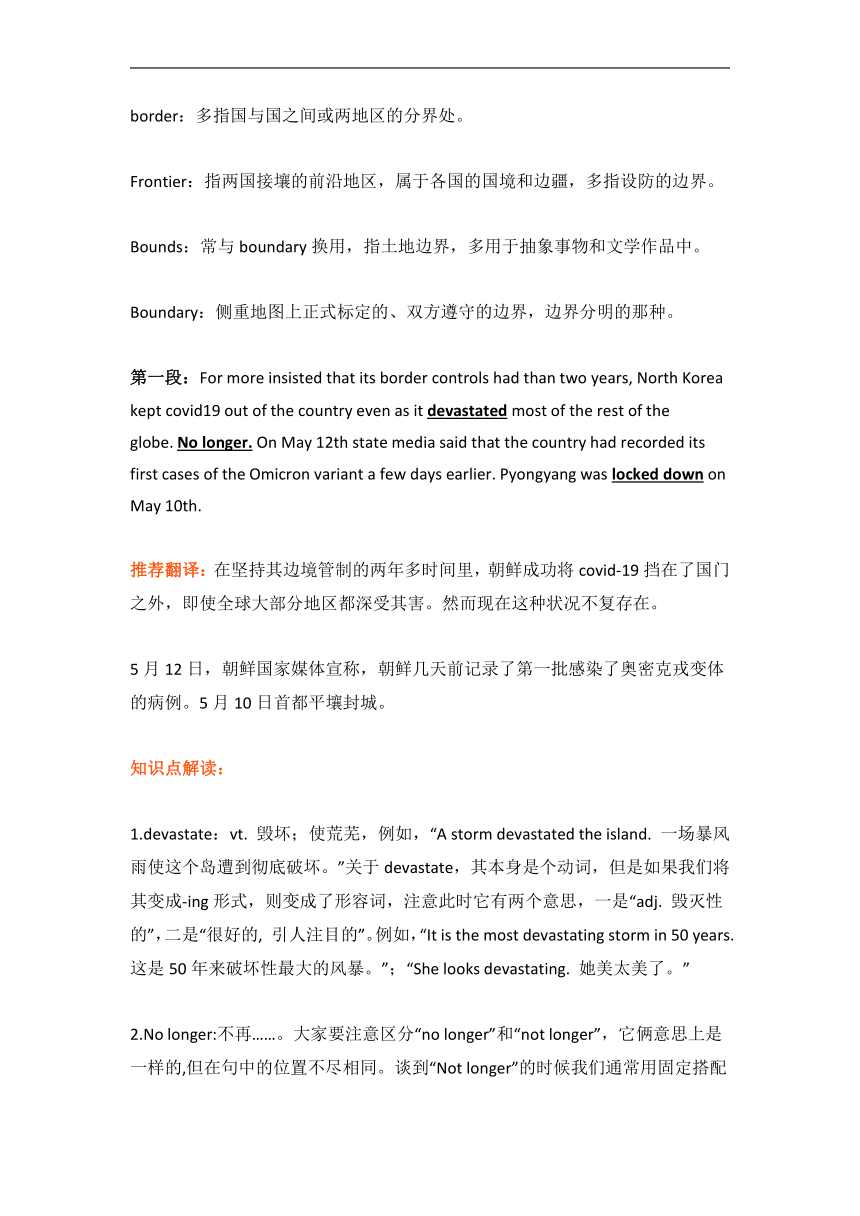
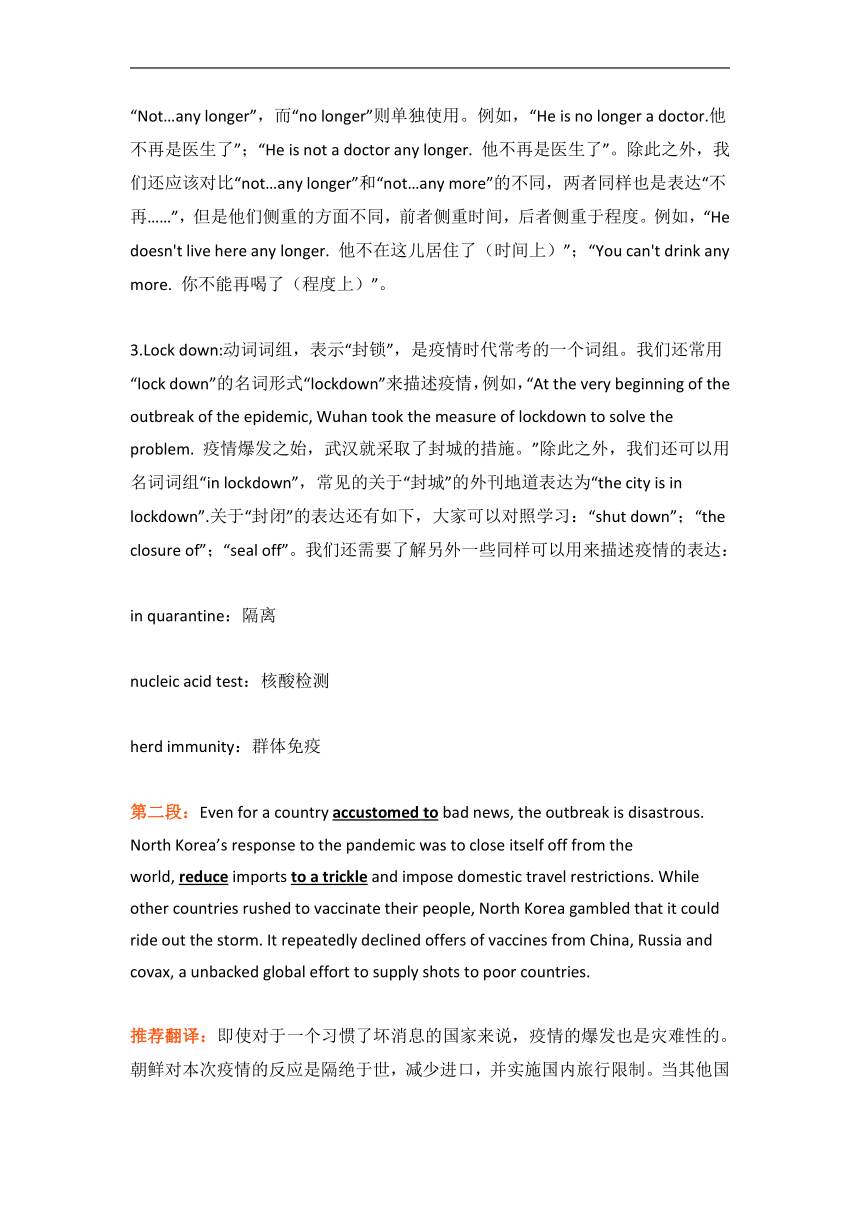
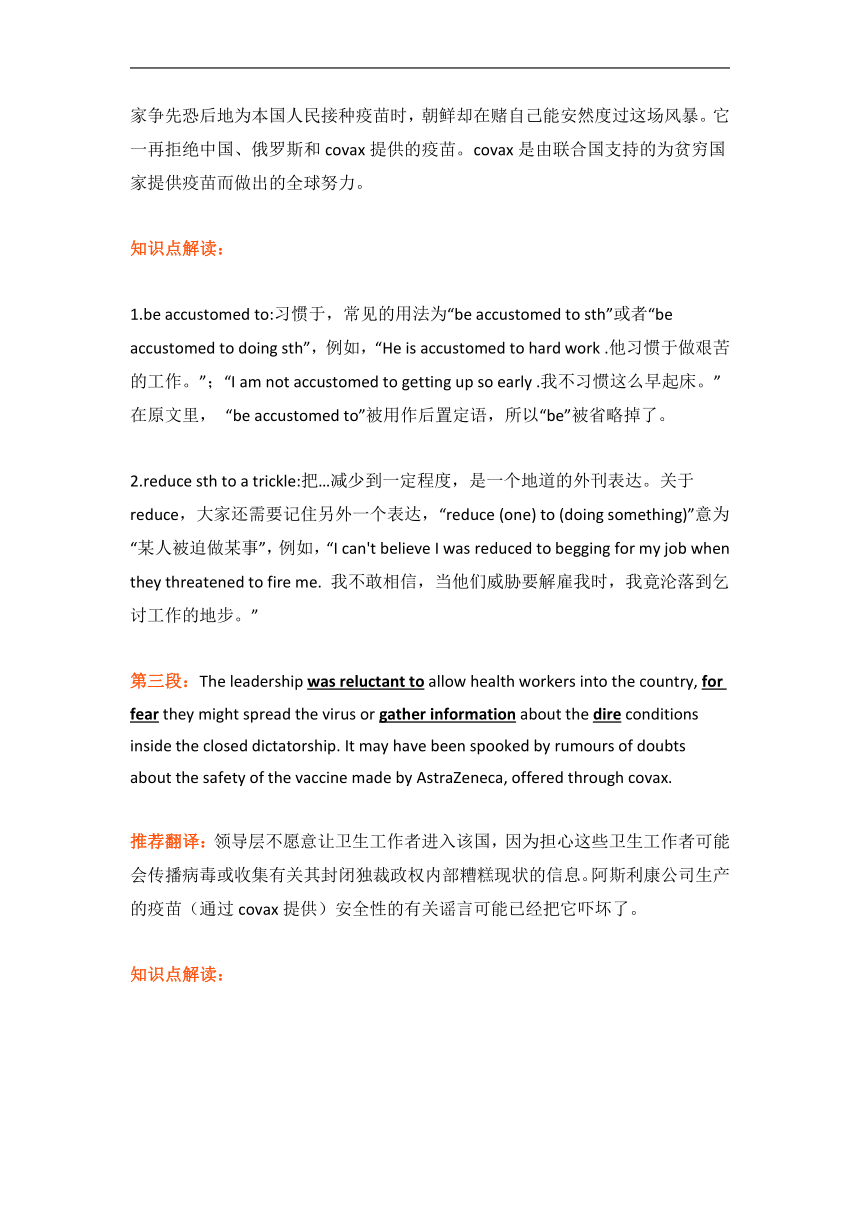
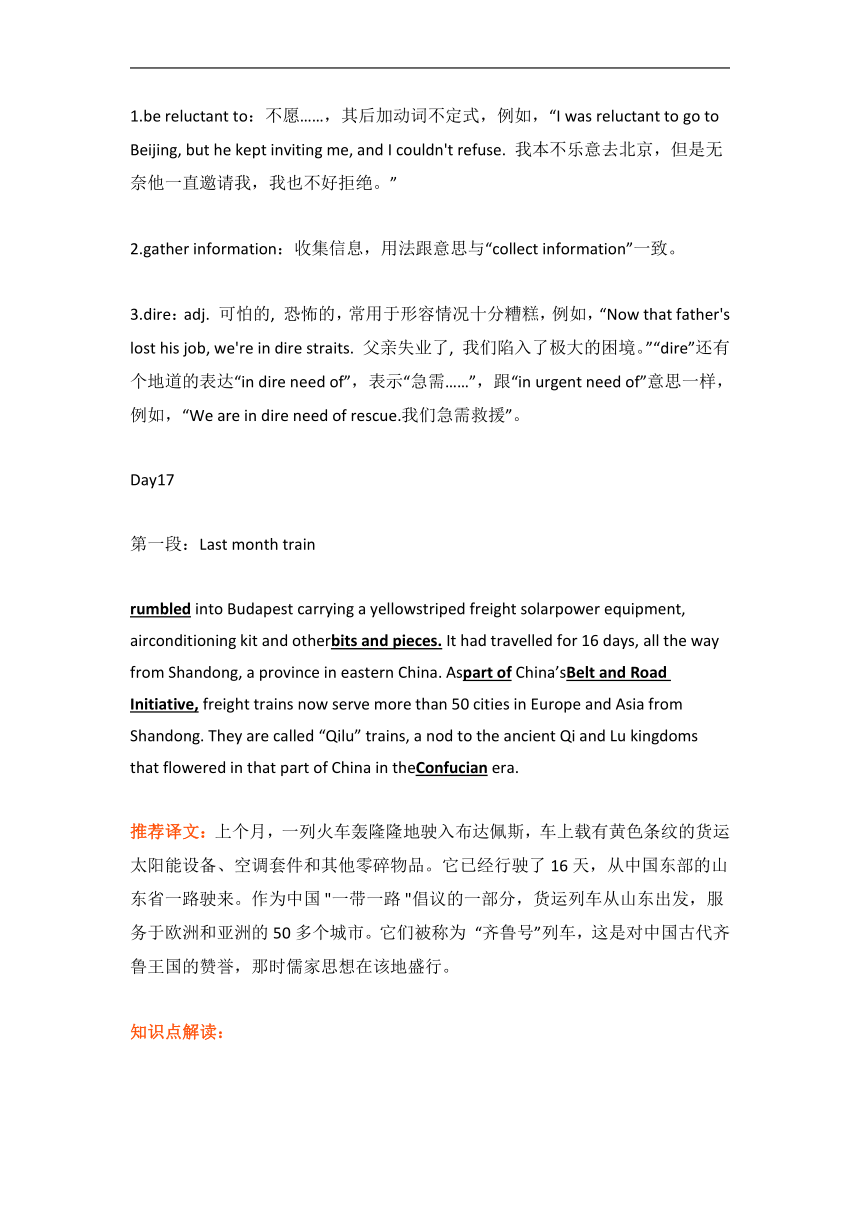
文档简介
2023届高考英语一轮讲义:D篇阅读精析Day16-17
Day16
前言:The leadership at last admits to an outbreakof covid-19 within its borders.
推荐翻译:朝鲜领导人终于承认covid-19在境内爆发。
知识点解读:
1.admit:vt. & vi. 许可进入;承认。其名词形式为“admission”,意为“n. 准许进入,入场券,承认, 供认”。
2.outbreak:爆发,为“break out”的名词形式。例如,“The cholera outbreak has been contained. 霍乱的发生已被控制住了。”关于“爆发”的其他表达如下,大家要注意积累,做到多样化写作。
outbreak :特指短时间内,疾病、疫情等突然爆发。
Epidemic:流行,特指大传染病,比如说霍乱。
Pandemic:大流行,程度比epidemic更深,传染范围更广,短时间内迅速蔓延。
Sporadic:零散爆发,一般是疾病、疫情零零散散发生,呈历年来一般水平。
Endemic:一般是指医学上的地方病。
3.border:n. 边缘,边界, 边境,常见的地道表达为“on the border of 临近;将要”,“border trade 边境贸易”,“border crossing 边境通道,过境处”等。关于“border”,我们主要要学习区分其与其它同样表达“边界”的词的区别:
border:多指国与国之间或两地区的分界处。
Frontier:指两国接壤的前沿地区,属于各国的国境和边疆,多指设防的边界。
Bounds:常与boundary换用,指土地边界,多用于抽象事物和文学作品中。
Boundary:侧重地图上正式标定的、双方遵守的边界,边界分明的那种。
第一段:For more insisted that its border controls had than two years, North Korea kept covid19 out of the country even as it devastated most of the rest of the globe. No longer. On May 12th state media said that the country had recorded its first cases of the Omicron variant a few days earlier. Pyongyang was locked down on May 10th.
推荐翻译:在坚持其边境管制的两年多时间里,朝鲜成功将covid-19挡在了国门之外,即使全球大部分地区都深受其害。然而现在这种状况不复存在。
5月12日,朝鲜国家媒体宣称,朝鲜几天前记录了第一批感染了奥密克戎变体的病例。5月10日首都平壤封城。
知识点解读:
1.devastate:vt. 毁坏;使荒芜,例如,“A storm devastated the island. 一场暴风雨使这个岛遭到彻底破坏。”关于devastate,其本身是个动词,但是如果我们将其变成-ing形式,则变成了形容词,注意此时它有两个意思,一是“adj. 毁灭性的”,二是“很好的, 引人注目的”。例如,“It is the most devastating storm in 50 years. 这是50年来破坏性最大的风暴。”;“She looks devastating. 她美太美了。”
2.No longer:不再……。大家要注意区分“no longer”和“not longer”,它俩意思上是一样的,但在句中的位置不尽相同。谈到“Not longer”的时候我们通常用固定搭配“Not…any longer”,而“no longer”则单独使用。例如,“He is no longer a doctor.他不再是医生了”;“He is not a doctor any longer. 他不再是医生了”。除此之外,我们还应该对比“not…any longer”和“not…any more”的不同,两者同样也是表达“不再……”,但是他们侧重的方面不同,前者侧重时间,后者侧重于程度。例如,“He doesn't live here any longer. 他不在这儿居住了(时间上)”;“You can't drink any more. 你不能再喝了(程度上)”。
3.Lock down:动词词组,表示“封锁”,是疫情时代常考的一个词组。我们还常用“lock down”的名词形式“lockdown”来描述疫情,例如,“At the very beginning of the outbreak of the epidemic, Wuhan took the measure of lockdown to solve the problem. 疫情爆发之始,武汉就采取了封城的措施。”除此之外,我们还可以用名词词组“in lockdown”,常见的关于“封城”的外刊地道表达为“the city is in lockdown”.关于“封闭”的表达还有如下,大家可以对照学习:“shut down”;“the closure of”;“seal off”。我们还需要了解另外一些同样可以用来描述疫情的表达:
in quarantine:隔离
nucleic acid test:核酸检测
herd immunity:群体免疫
第二段:Even for a country accustomed to bad news, the outbreak is disastrous. North Korea’s response to the pandemic was to close itself off from the world, reduce imports to a trickle and impose domestic travel restrictions. While other countries rushed to vaccinate their people, North Korea gambled that it could ride out the storm. It repeatedly declined offers of vaccines from China, Russia and covax, a unbacked global effort to supply shots to poor countries.
推荐翻译:即使对于一个习惯了坏消息的国家来说,疫情的爆发也是灾难性的。朝鲜对本次疫情的反应是隔绝于世,减少进口,并实施国内旅行限制。当其他国家争先恐后地为本国人民接种疫苗时,朝鲜却在赌自己能安然度过这场风暴。它一再拒绝中国、俄罗斯和covax提供的疫苗。covax是由联合国支持的为贫穷国家提供疫苗而做出的全球努力。
知识点解读:
1.be accustomed to:习惯于,常见的用法为“be accustomed to sth”或者“be accustomed to doing sth”,例如,“He is accustomed to hard work .他习惯于做艰苦的工作。”;“I am not accustomed to getting up so early .我不习惯这么早起床。”在原文里, “be accustomed to”被用作后置定语,所以“be”被省略掉了。
2.reduce sth to a trickle:把…减少到一定程度,是一个地道的外刊表达。关于reduce,大家还需要记住另外一个表达,“reduce (one) to (doing something)”意为“某人被迫做某事”,例如,“I can't believe I was reduced to begging for my job when they threatened to fire me. 我不敢相信,当他们威胁要解雇我时,我竟沦落到乞讨工作的地步。”
第三段:The leadership was reluctant to allow health workers into the country, for fear they might spread the virus or gather information about the dire conditions inside the closed dictatorship. It may have been spooked by rumours of doubts about the safety of the vaccine made by AstraZeneca, offered through covax.
推荐翻译:领导层不愿意让卫生工作者进入该国,因为担心这些卫生工作者可能会传播病毒或收集有关其封闭独裁政权内部糟糕现状的信息。阿斯利康公司生产的疫苗(通过covax提供)安全性的有关谣言可能已经把它吓坏了。
知识点解读:
1.be reluctant to:不愿……,其后加动词不定式,例如,“I was reluctant to go to Beijing, but he kept inviting me, and I couldn't refuse. 我本不乐意去北京,但是无奈他一直邀请我,我也不好拒绝。”
2.gather information:收集信息,用法跟意思与“collect information”一致。
3.dire:adj. 可怕的, 恐怖的,常用于形容情况十分糟糕,例如,“Now that father's lost his job, we're in dire straits. 父亲失业了, 我们陷入了极大的困境。”“dire”还有个地道的表达“in dire need of”,表示“急需……”,跟“in urgent need of”意思一样,例如,“We are in dire need of rescue.我们急需救援”。
Day17
第一段:Last month train
rumbled into Budapest carrying a yellowstriped freight solarpower equipment, airconditioning kit and otherbits and pieces. It had travelled for 16 days, all the way from Shandong, a province in eastern China. Aspart of China’sBelt and Road Initiative, freight trains now serve more than 50 cities in Europe and Asia from Shandong. They are called “Qilu” trains, a nod to the ancient Qi and Lu kingdoms that flowered in that part of China in theConfucian era.
推荐译文:上个月,一列火车轰隆隆地驶入布达佩斯,车上载有黄色条纹的货运太阳能设备、空调套件和其他零碎物品。它已经行驶了16天,从中国东部的山东省一路驶来。作为中国 "一带一路 "倡议的一部分,货运列车从山东出发,服务于欧洲和亚洲的50多个城市。它们被称为 “齐鲁号”列车,这是对中国古代齐鲁王国的赞誉,那时儒家思想在该地盛行。
知识点解读:
1.rumble:隆隆声,尤指大炮、车流或雷电发出的声音。〔a series of long low sounds, especially from big guns, traffic, or THUNDER〕,例如,“The train rumbled past. 火车隆隆地驶过。”
在这里我们需要积累关于不同声音的不同表达:
Splash:液体泼溅的声音,溅泼声,{ the sound that a liquid makes when something hits it, or when it hits against another thing },例如,“The cup makes a splash when it is dropped into the water. 杯子掉入水中时发出泼溅声。”
rustle:沙沙声,窸窣声,尤其指纸张、树叶或者衣服发出的声音,{ a continuous quiet sound from papers, leaves, or clothes when they rub together},例如,“The leaves rustled in the wind. 树叶在风中飒飒作响。”
hum:嗡嗡声,尤指电子设备、发动机、蚊子等发出的声音或谈话的声音,{a quiet low continuous sound, especially from electrical equipment, an engine, or people's conversation},例如,“We hear the hum of conversation from the next room. 我们听到隔壁房间嗡嗡的谈话声。”
creak:门、木地、床等受到挤压后发出的嘎吱声,{a long high sound that something makes when someone opens it, walks on it, sits on it etc - used especially about a door, wooden floor, bed, or stairs},例如,“The door in the old house creaked noisily. 老房子的门发出嘎吱嘎吱的响声。”
2.bits and pieces:零星小玩意,非常地道的英文表达,例如,“I always have a lot of bits and pieces in my coat pocket. 我的大衣口袋里总是装着零七八碎的东西。”
3.part of:……的一部分。大家千万要注意,“……的一部分”这个表达是没有冠词a的,不能说成a part of.
4.Belt and Road Initiative:一带一路,外宣考试和MTI考研的热门词汇,因此我们在这对此相关的词汇做一些拓展:
文明之路:a road connecting different civilizations
廉洁之路:a road with high ethical standards
国之交在于民相亲,民相亲在于心相通:Friendship, which derives from close contact between the people, holds the key to sound state-to-state relations.
5.Confucian:儒家的,孔子,孔子的。千万要记住——孔子的英文是 “Confucian”,不是“Kongzi”,千万不要闹笑话,相应的,孟子的英文是“Mencius”而不是“Mengzi”,基本的文化常识要有。其对应的名词形式为“Confucianism”,表示“儒家思想,孔子学说”。
6.Era:时代,书面语用词,指历史上的纪元、年代,可与epoch和age互换,侧重时期的延续性和整个历程。我们对比学习一下跟其他表示“时代、时期”的词的区别:
age 常指具有显著特征或以某杰出人物命名的历史时代或时期。
epoch 正式用词,侧重指以某重大事件或巨大变化为起点的新的历史时期。
period 最普通用词,概念广泛,时间长短不限,既可指任何一个历史时期,又可指个人或自然界的一个发展阶段。
times 侧重某一特定时期。
如狄更斯在《双城记》的开篇写到的“这是一个最好的时代,这是一个最坏的时代……”中就用到了不同的词。
“It was the best of times, it was the worst of times, it was the age of wisdom, it was the age of foolishness, it was the epoch of belief, it was the epoch of incredulity, it was the season of Light, it was the season of Darkness, it was the spring of hope, it was the winter of despair, we had everything before us, we had nothing before us, we were all going direct to Heaven, we were all going direct the other way--in short, the period was so. far like the present period, that some of its noisiest authorities insisted on its being received, for good or for evil, in the superlative degree of comparison only.”
第二段:China’s exports, whether by rail, road, sea or air, have made rapid progress in the past two years. They rose by almost 30% in dollar terms in 2021. Over 5,000 Qilu trains have left the station since 2018. But in April, China’s export growth slowed to a desultory chug. In dollar terms, exports were only 3.9% higher than a year earlier.
推荐翻译:中国的出口,无论是通过铁路、公路、海运还是空运,在过去两年都取得了快速进展。按美元计算,它们在2021年增长了近30%。自2018年以来,超过5000辆齐鲁列车已经离站。但在4月份,中国的出口增长放缓到一个令人失望的地步。按美元计算,出口仅比上年同期增长3.9%。
知识点解读:
1.Rise by:“上升了…“,强调的是上升的量。另一个长得很像的词组是”rise to“,表示的意思是”上升到了……“,强调的是上升的结果,大家一定要注意区分。除此之外,关于”rise“这个词,我们还要对比其与另外两个词:raise和arise:
Rise:指具体的或抽象的事物由低向高移动,例如,“House prices have risen sharply in recent months. 房价在最近几个月里急剧上涨。“常见的固定搭配有“on the rise 在增加;在上涨”,“give rise to 使发生,引起”,“rise up 上升;起义;叛变”等。
arise 书面用词,多用于诗歌或比喻中,具有特殊的修辞色彩,例如,“A sudden impulse of anger arose in him.他突然升起一阵怒火。”常见的固定搭配为“arise from 由…引起,起因于”。
raise多指把某物从低处升到高处,有时作引申用,例如,“raise a flag.升旗。”除此之外,“raise”还可以表示“抚养”,比如说,“raise children.抚养孩子。
第三段:To increase trade by any amount in these conditions is impressive. But the headline 3.9% expansion reported by China’s customs agency on May 9th was more nominal than real. More detailed statistics, published later in the month, are likely to show that the price of China’s exports rose by perhaps 8% or more in April, compared with a year earlier, according to ubs, a bank. If so, the volume of China’s exports must have shrunk last month.
推荐翻译:在这种情况下,贸易增长的任何数量都是令人印象深刻的。但是,中国海关总署5月9日报告的3.9%的头条扩张是名义上的,而不是实际的。据ubs银行称,本月晚些时候公布的更详细的统计数据可能会显示,与一年前相比,中国4月份的出口价格可能上升了8%或更多。如果是这样的话,中国的出口量在上个月肯定有所缩减。
知识点解读:
1.Shrink:vt. & vi. 收缩;退缩,过去式和过去分词分别为“shrank”和“shrunk”。常见的地道表达有“shrink from 退避;在…前面畏缩”,例如,“A shy man shrinks from meeting strangers. 羞怯的人怕见生人。”
在这里需要对比几个表达“收缩”的词语:
shrink 侧重指因收缩而达不到原有的长度、体积或容积,例如,“The dress shrank when I washed it. 这件衣服洗后缩水了。”
condense 指将东西压缩得更紧密、紧凑,但不失去原有的内容,例如,“Soup condenses when boiled. 汤煮过后就浓了。”
compress 指把乱而不成形的东西压成一定形状,例如,“Wood blocks may compress a great deal under pressure. 木块受压时可缩小很多。”
contract 主要指以内、外部力量进行紧缩,也可用作引申,除此之外,contract还可以表示“合同”。同样能表达“合同、条约”的还有“agreement”和“treaty”。
Day16
前言:The leadership at last admits to an outbreakof covid-19 within its borders.
推荐翻译:朝鲜领导人终于承认covid-19在境内爆发。
知识点解读:
1.admit:vt. & vi. 许可进入;承认。其名词形式为“admission”,意为“n. 准许进入,入场券,承认, 供认”。
2.outbreak:爆发,为“break out”的名词形式。例如,“The cholera outbreak has been contained. 霍乱的发生已被控制住了。”关于“爆发”的其他表达如下,大家要注意积累,做到多样化写作。
outbreak :特指短时间内,疾病、疫情等突然爆发。
Epidemic:流行,特指大传染病,比如说霍乱。
Pandemic:大流行,程度比epidemic更深,传染范围更广,短时间内迅速蔓延。
Sporadic:零散爆发,一般是疾病、疫情零零散散发生,呈历年来一般水平。
Endemic:一般是指医学上的地方病。
3.border:n. 边缘,边界, 边境,常见的地道表达为“on the border of 临近;将要”,“border trade 边境贸易”,“border crossing 边境通道,过境处”等。关于“border”,我们主要要学习区分其与其它同样表达“边界”的词的区别:
border:多指国与国之间或两地区的分界处。
Frontier:指两国接壤的前沿地区,属于各国的国境和边疆,多指设防的边界。
Bounds:常与boundary换用,指土地边界,多用于抽象事物和文学作品中。
Boundary:侧重地图上正式标定的、双方遵守的边界,边界分明的那种。
第一段:For more insisted that its border controls had than two years, North Korea kept covid19 out of the country even as it devastated most of the rest of the globe. No longer. On May 12th state media said that the country had recorded its first cases of the Omicron variant a few days earlier. Pyongyang was locked down on May 10th.
推荐翻译:在坚持其边境管制的两年多时间里,朝鲜成功将covid-19挡在了国门之外,即使全球大部分地区都深受其害。然而现在这种状况不复存在。
5月12日,朝鲜国家媒体宣称,朝鲜几天前记录了第一批感染了奥密克戎变体的病例。5月10日首都平壤封城。
知识点解读:
1.devastate:vt. 毁坏;使荒芜,例如,“A storm devastated the island. 一场暴风雨使这个岛遭到彻底破坏。”关于devastate,其本身是个动词,但是如果我们将其变成-ing形式,则变成了形容词,注意此时它有两个意思,一是“adj. 毁灭性的”,二是“很好的, 引人注目的”。例如,“It is the most devastating storm in 50 years. 这是50年来破坏性最大的风暴。”;“She looks devastating. 她美太美了。”
2.No longer:不再……。大家要注意区分“no longer”和“not longer”,它俩意思上是一样的,但在句中的位置不尽相同。谈到“Not longer”的时候我们通常用固定搭配“Not…any longer”,而“no longer”则单独使用。例如,“He is no longer a doctor.他不再是医生了”;“He is not a doctor any longer. 他不再是医生了”。除此之外,我们还应该对比“not…any longer”和“not…any more”的不同,两者同样也是表达“不再……”,但是他们侧重的方面不同,前者侧重时间,后者侧重于程度。例如,“He doesn't live here any longer. 他不在这儿居住了(时间上)”;“You can't drink any more. 你不能再喝了(程度上)”。
3.Lock down:动词词组,表示“封锁”,是疫情时代常考的一个词组。我们还常用“lock down”的名词形式“lockdown”来描述疫情,例如,“At the very beginning of the outbreak of the epidemic, Wuhan took the measure of lockdown to solve the problem. 疫情爆发之始,武汉就采取了封城的措施。”除此之外,我们还可以用名词词组“in lockdown”,常见的关于“封城”的外刊地道表达为“the city is in lockdown”.关于“封闭”的表达还有如下,大家可以对照学习:“shut down”;“the closure of”;“seal off”。我们还需要了解另外一些同样可以用来描述疫情的表达:
in quarantine:隔离
nucleic acid test:核酸检测
herd immunity:群体免疫
第二段:Even for a country accustomed to bad news, the outbreak is disastrous. North Korea’s response to the pandemic was to close itself off from the world, reduce imports to a trickle and impose domestic travel restrictions. While other countries rushed to vaccinate their people, North Korea gambled that it could ride out the storm. It repeatedly declined offers of vaccines from China, Russia and covax, a unbacked global effort to supply shots to poor countries.
推荐翻译:即使对于一个习惯了坏消息的国家来说,疫情的爆发也是灾难性的。朝鲜对本次疫情的反应是隔绝于世,减少进口,并实施国内旅行限制。当其他国家争先恐后地为本国人民接种疫苗时,朝鲜却在赌自己能安然度过这场风暴。它一再拒绝中国、俄罗斯和covax提供的疫苗。covax是由联合国支持的为贫穷国家提供疫苗而做出的全球努力。
知识点解读:
1.be accustomed to:习惯于,常见的用法为“be accustomed to sth”或者“be accustomed to doing sth”,例如,“He is accustomed to hard work .他习惯于做艰苦的工作。”;“I am not accustomed to getting up so early .我不习惯这么早起床。”在原文里, “be accustomed to”被用作后置定语,所以“be”被省略掉了。
2.reduce sth to a trickle:把…减少到一定程度,是一个地道的外刊表达。关于reduce,大家还需要记住另外一个表达,“reduce (one) to (doing something)”意为“某人被迫做某事”,例如,“I can't believe I was reduced to begging for my job when they threatened to fire me. 我不敢相信,当他们威胁要解雇我时,我竟沦落到乞讨工作的地步。”
第三段:The leadership was reluctant to allow health workers into the country, for fear they might spread the virus or gather information about the dire conditions inside the closed dictatorship. It may have been spooked by rumours of doubts about the safety of the vaccine made by AstraZeneca, offered through covax.
推荐翻译:领导层不愿意让卫生工作者进入该国,因为担心这些卫生工作者可能会传播病毒或收集有关其封闭独裁政权内部糟糕现状的信息。阿斯利康公司生产的疫苗(通过covax提供)安全性的有关谣言可能已经把它吓坏了。
知识点解读:
1.be reluctant to:不愿……,其后加动词不定式,例如,“I was reluctant to go to Beijing, but he kept inviting me, and I couldn't refuse. 我本不乐意去北京,但是无奈他一直邀请我,我也不好拒绝。”
2.gather information:收集信息,用法跟意思与“collect information”一致。
3.dire:adj. 可怕的, 恐怖的,常用于形容情况十分糟糕,例如,“Now that father's lost his job, we're in dire straits. 父亲失业了, 我们陷入了极大的困境。”“dire”还有个地道的表达“in dire need of”,表示“急需……”,跟“in urgent need of”意思一样,例如,“We are in dire need of rescue.我们急需救援”。
Day17
第一段:Last month train
rumbled into Budapest carrying a yellowstriped freight solarpower equipment, airconditioning kit and otherbits and pieces. It had travelled for 16 days, all the way from Shandong, a province in eastern China. Aspart of China’sBelt and Road Initiative, freight trains now serve more than 50 cities in Europe and Asia from Shandong. They are called “Qilu” trains, a nod to the ancient Qi and Lu kingdoms that flowered in that part of China in theConfucian era.
推荐译文:上个月,一列火车轰隆隆地驶入布达佩斯,车上载有黄色条纹的货运太阳能设备、空调套件和其他零碎物品。它已经行驶了16天,从中国东部的山东省一路驶来。作为中国 "一带一路 "倡议的一部分,货运列车从山东出发,服务于欧洲和亚洲的50多个城市。它们被称为 “齐鲁号”列车,这是对中国古代齐鲁王国的赞誉,那时儒家思想在该地盛行。
知识点解读:
1.rumble:隆隆声,尤指大炮、车流或雷电发出的声音。〔a series of long low sounds, especially from big guns, traffic, or THUNDER〕,例如,“The train rumbled past. 火车隆隆地驶过。”
在这里我们需要积累关于不同声音的不同表达:
Splash:液体泼溅的声音,溅泼声,{ the sound that a liquid makes when something hits it, or when it hits against another thing },例如,“The cup makes a splash when it is dropped into the water. 杯子掉入水中时发出泼溅声。”
rustle:沙沙声,窸窣声,尤其指纸张、树叶或者衣服发出的声音,{ a continuous quiet sound from papers, leaves, or clothes when they rub together},例如,“The leaves rustled in the wind. 树叶在风中飒飒作响。”
hum:嗡嗡声,尤指电子设备、发动机、蚊子等发出的声音或谈话的声音,{a quiet low continuous sound, especially from electrical equipment, an engine, or people's conversation},例如,“We hear the hum of conversation from the next room. 我们听到隔壁房间嗡嗡的谈话声。”
creak:门、木地、床等受到挤压后发出的嘎吱声,{a long high sound that something makes when someone opens it, walks on it, sits on it etc - used especially about a door, wooden floor, bed, or stairs},例如,“The door in the old house creaked noisily. 老房子的门发出嘎吱嘎吱的响声。”
2.bits and pieces:零星小玩意,非常地道的英文表达,例如,“I always have a lot of bits and pieces in my coat pocket. 我的大衣口袋里总是装着零七八碎的东西。”
3.part of:……的一部分。大家千万要注意,“……的一部分”这个表达是没有冠词a的,不能说成a part of.
4.Belt and Road Initiative:一带一路,外宣考试和MTI考研的热门词汇,因此我们在这对此相关的词汇做一些拓展:
文明之路:a road connecting different civilizations
廉洁之路:a road with high ethical standards
国之交在于民相亲,民相亲在于心相通:Friendship, which derives from close contact between the people, holds the key to sound state-to-state relations.
5.Confucian:儒家的,孔子,孔子的。千万要记住——孔子的英文是 “Confucian”,不是“Kongzi”,千万不要闹笑话,相应的,孟子的英文是“Mencius”而不是“Mengzi”,基本的文化常识要有。其对应的名词形式为“Confucianism”,表示“儒家思想,孔子学说”。
6.Era:时代,书面语用词,指历史上的纪元、年代,可与epoch和age互换,侧重时期的延续性和整个历程。我们对比学习一下跟其他表示“时代、时期”的词的区别:
age 常指具有显著特征或以某杰出人物命名的历史时代或时期。
epoch 正式用词,侧重指以某重大事件或巨大变化为起点的新的历史时期。
period 最普通用词,概念广泛,时间长短不限,既可指任何一个历史时期,又可指个人或自然界的一个发展阶段。
times 侧重某一特定时期。
如狄更斯在《双城记》的开篇写到的“这是一个最好的时代,这是一个最坏的时代……”中就用到了不同的词。
“It was the best of times, it was the worst of times, it was the age of wisdom, it was the age of foolishness, it was the epoch of belief, it was the epoch of incredulity, it was the season of Light, it was the season of Darkness, it was the spring of hope, it was the winter of despair, we had everything before us, we had nothing before us, we were all going direct to Heaven, we were all going direct the other way--in short, the period was so. far like the present period, that some of its noisiest authorities insisted on its being received, for good or for evil, in the superlative degree of comparison only.”
第二段:China’s exports, whether by rail, road, sea or air, have made rapid progress in the past two years. They rose by almost 30% in dollar terms in 2021. Over 5,000 Qilu trains have left the station since 2018. But in April, China’s export growth slowed to a desultory chug. In dollar terms, exports were only 3.9% higher than a year earlier.
推荐翻译:中国的出口,无论是通过铁路、公路、海运还是空运,在过去两年都取得了快速进展。按美元计算,它们在2021年增长了近30%。自2018年以来,超过5000辆齐鲁列车已经离站。但在4月份,中国的出口增长放缓到一个令人失望的地步。按美元计算,出口仅比上年同期增长3.9%。
知识点解读:
1.Rise by:“上升了…“,强调的是上升的量。另一个长得很像的词组是”rise to“,表示的意思是”上升到了……“,强调的是上升的结果,大家一定要注意区分。除此之外,关于”rise“这个词,我们还要对比其与另外两个词:raise和arise:
Rise:指具体的或抽象的事物由低向高移动,例如,“House prices have risen sharply in recent months. 房价在最近几个月里急剧上涨。“常见的固定搭配有“on the rise 在增加;在上涨”,“give rise to 使发生,引起”,“rise up 上升;起义;叛变”等。
arise 书面用词,多用于诗歌或比喻中,具有特殊的修辞色彩,例如,“A sudden impulse of anger arose in him.他突然升起一阵怒火。”常见的固定搭配为“arise from 由…引起,起因于”。
raise多指把某物从低处升到高处,有时作引申用,例如,“raise a flag.升旗。”除此之外,“raise”还可以表示“抚养”,比如说,“raise children.抚养孩子。
第三段:To increase trade by any amount in these conditions is impressive. But the headline 3.9% expansion reported by China’s customs agency on May 9th was more nominal than real. More detailed statistics, published later in the month, are likely to show that the price of China’s exports rose by perhaps 8% or more in April, compared with a year earlier, according to ubs, a bank. If so, the volume of China’s exports must have shrunk last month.
推荐翻译:在这种情况下,贸易增长的任何数量都是令人印象深刻的。但是,中国海关总署5月9日报告的3.9%的头条扩张是名义上的,而不是实际的。据ubs银行称,本月晚些时候公布的更详细的统计数据可能会显示,与一年前相比,中国4月份的出口价格可能上升了8%或更多。如果是这样的话,中国的出口量在上个月肯定有所缩减。
知识点解读:
1.Shrink:vt. & vi. 收缩;退缩,过去式和过去分词分别为“shrank”和“shrunk”。常见的地道表达有“shrink from 退避;在…前面畏缩”,例如,“A shy man shrinks from meeting strangers. 羞怯的人怕见生人。”
在这里需要对比几个表达“收缩”的词语:
shrink 侧重指因收缩而达不到原有的长度、体积或容积,例如,“The dress shrank when I washed it. 这件衣服洗后缩水了。”
condense 指将东西压缩得更紧密、紧凑,但不失去原有的内容,例如,“Soup condenses when boiled. 汤煮过后就浓了。”
compress 指把乱而不成形的东西压成一定形状,例如,“Wood blocks may compress a great deal under pressure. 木块受压时可缩小很多。”
contract 主要指以内、外部力量进行紧缩,也可用作引申,除此之外,contract还可以表示“合同”。同样能表达“合同、条约”的还有“agreement”和“treaty”。
